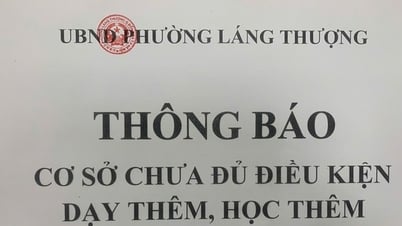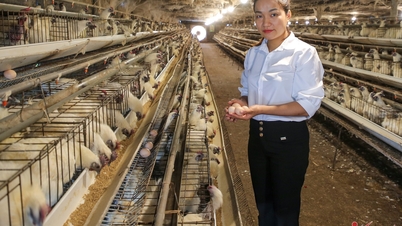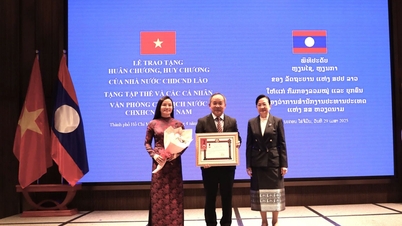Many UK universities have been accused of giving low entry scores to students from Asia, Africa and the Middle East because these groups pay higher tuition fees than domestic students.
Specifically, The Sunday Times accused 15/24 universities in the Russell Group (top public research universities) of lowering entry standards and creating "back doors" for international students to increase revenue, at the end of January. The newspaper's information showed that the schools hired agents to recruit students in the Middle East, Africa and Asia for international foundation courses costing £16,000 (492 million VND) and paid them 20% of the tuition fee.
International students are typically required to take a foundation course before starting their degree. The allegations allege that they only need to achieve a D in their A-levels (used for university entrance in the UK) to enter the course, while domestic students need to achieve A and A+ grades.
The Sunday Times cited the University of York as asking staff to be "more flexible" in accepting international students with low grades, while recruitment agents for Durham and Exeter universities claimed that international students with poor grades could be more easily accepted into their programmes, through foundation courses.
The universities said the allegations were unfounded. Vivienne Stern, chief executive of Universities UK (UUK), said foundation programmes, designed to prepare students for a degree, had their own admissions process and different entry requirements to mainstream courses.
“Foundation programmes do not guarantee entry to a university. The Sunday Times did not distinguish between the two programmes in terms of entry requirements,” she said, adding that most UUK members also run foundation courses for British students, with the same entry requirements as international students.

A corner of Durham University campus. Photo: Durham University
In addition, universities criticised the Sunday Times report for ignoring figures showing an increase in the number of domestic students studying at Russell Group universities. In the 2021-2022 academic year, the number of domestic students increased by more than 41,000, while international students fell by more than 7,300 compared to the previous year, according to a report by the UK Higher Education Statistics Agency (Hesa).
To address the allegations, UUK said it would commission a rapid review of its foundation courses by the Quality Assurance Agency, comparing entry requirements for international and domestic students. It would also review the use of recruitment agents and update its rules for recruiting international students.
“Students, families and the government must have confidence that the system is fair, transparent and robust,” UUK said.
Universities in the UK have relied heavily on income from international students since 2016. The government has kept undergraduate tuition fees for domestic students below £9,250 a year. However, universities are free to raise fees for international students, which can be as high as £40,000 a year. A Guardian investigation last year found that international student income accounted for a fifth of many universities’ income.
Doan Hung
(According to Daily Mail, Guardian, The Tab, Times Higher Education )
Source link


![[Photo] Cultural, sports and media bloc at the 50th Anniversary of Southern Liberation and National Reunification Day](https://vphoto.vietnam.vn/thumb/1200x675/vietnam/resource/IMAGE/2025/4/30/8a22f876e8d24890be2ae3d88c9b201c)



![[Photo] Chinese, Lao, and Cambodian troops participate in the parade to celebrate the 50th anniversary of the Liberation of the South and National Reunification Day](https://vphoto.vietnam.vn/thumb/1200x675/vietnam/resource/IMAGE/2025/4/30/30d2204b414549cfb5dc784544a72dee)
![[Photo] The parade took to the streets, walking among the arms of tens of thousands of people.](https://vphoto.vietnam.vn/thumb/1200x675/vietnam/resource/IMAGE/2025/4/30/180ec64521094c87bdb5a983ff1a30a4)














![[Video] Ho Chi Minh City to organize mock high school graduation exams at the end of May 2025](https://vphoto.vietnam.vn/thumb/402x226/vietnam/resource/IMAGE/2025/4/30/b62e7183fd9843449576840bea1d3836)










![[Photo] Performance of the Air Force Squadron at the 50th Anniversary of the Liberation of the South and National Reunification Day](https://vphoto.vietnam.vn/thumb/1200x675/vietnam/resource/IMAGE/2025/4/30/cb781ed625fc4774bb82982d31bead1e)




































































Comment (0)